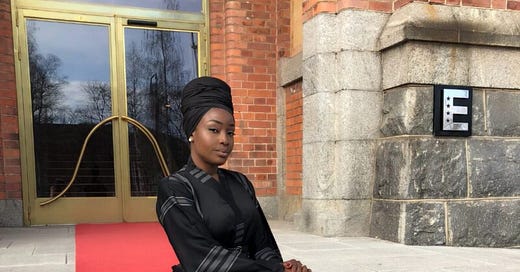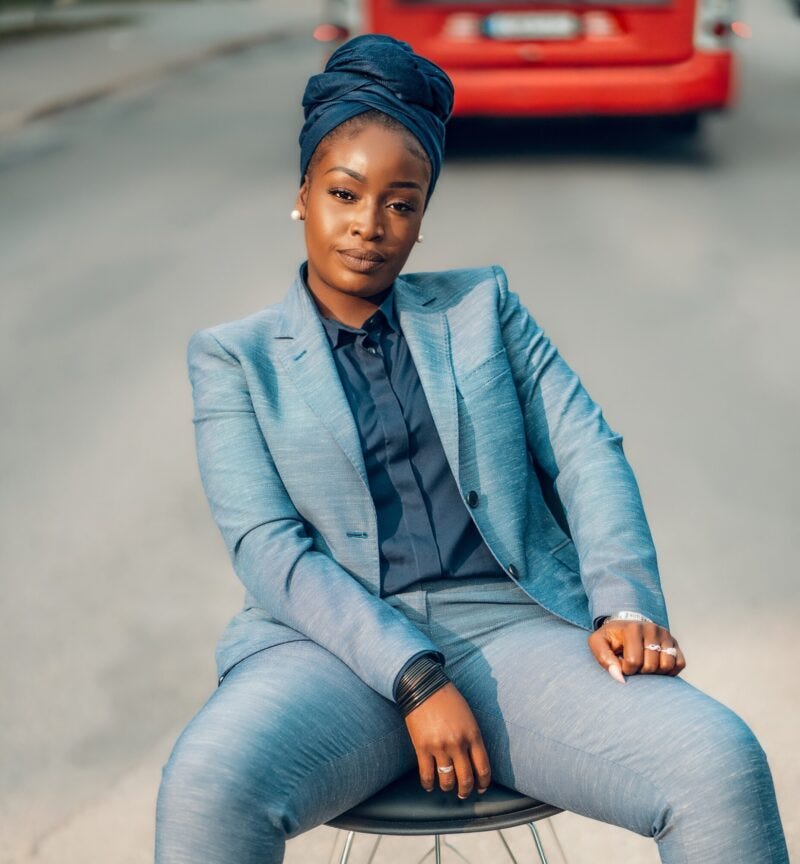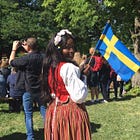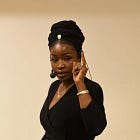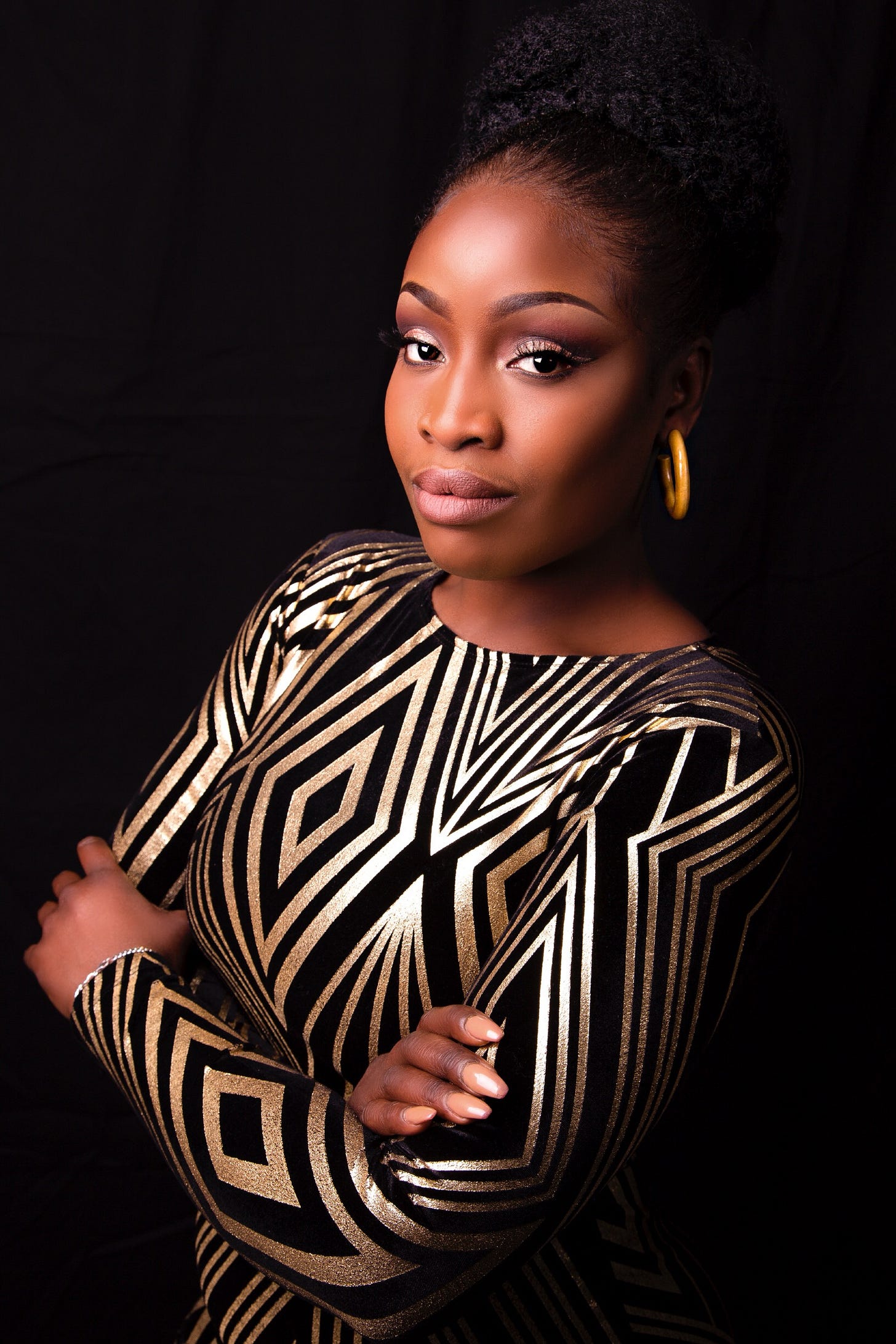How Lovette Jallow Sparked #Swedengate—and Exposed Sweden’s Silence on Race
The Swedish author, lecturer, and leading expert on anti-racism and structural inequity explains what #Swedengate revealed and why speaking the truth in Sweden still comes at a cost.
Lovette Jallow and the Hungry Kids vs. the Image of Sweden: How #Swedengate Started with a Tweet and Uncovered a Nation’s Blind Spot
In May 2022, I posted what I thought was a simple reflection: a tweet about a familiar Swedish custom—refusing to feed guests, even children. I was recalling a moment from my own childhood as a Black girl newly arrived in Sweden. But what started as a personal anecdote exploded into something far bigger.
Within days, that tweet sparked the viral hashtag #Swedengate, drawing millions into a global conversation. What people claimed was “just a cultural difference” quickly revealed deeper fractures—racial exclusion, institutional denial, and Sweden’s fragile relationship with self-image.
It was never just about food. It was about who gets to belong, who is expected to stay quiet, and what happens when Black women speak openly about structural harm in a country that prides itself on progressiveness.
Lovette Jallow on How a Childhood Memory Sparked #Swedengate and Challenged Swedish Norms
It didn’t start as a campaign. It started as a memory.
I was scrolling Twitter one afternoon in May 2022 when I casually shared something many immigrant kids in Sweden have quietly known for decades: if you were at a Swedish friend’s house around dinnertime, you were expected to wait—alone—while they sat down with their family to eat.
I tweeted:
“Laughing at Twitter finding out that Swedish people will not feed strangers 😂😂 as a kid growing up here we knew to just go home around dinner time. On the flipside, my mom would feed Swedish kids though.”
I added more:
“Swedes are an antisocial and weird lot. A lot of foul things are just accepted as ‘normal.’ Not feeding your kids’ friends is one of those things.”
And:
“I found out the hard way when I came to Sweden at age 11. Went to a friend’s house for the first time playing and their mom calls them for dinner. Mind you, when this friend was at my house, my mom would dish out some Gambian food for them as well. Which they ate gladly.”
Then the tweet that crystallized it:
“As I trailed behind my friend heading for the dinner table, the mom sternly told me I was allowed to wait and play with the toys in my friend’s room until dinner was done. Let me just say, the Swedes are not well at all.”
By the end of the day, the tweets had taken on a life of their own—12 million views, 10,000+ reposts, and a single word trending worldwide: #Swedengate.
But what began as a reflection on Swedish hospitality customs quickly unraveled into something deeper:
A reckoning with racial exclusion, cultural isolation, and the quiet violences embedded in so-called “neutral” Scandinavian norms.
The tweets didn’t go viral because they were about food.
They went viral because so many people—from immigrants in Sweden to racialized communities around the world—recognized the pattern:
Being welcomed in name, but not in practice. Being tolerated, but never truly included.
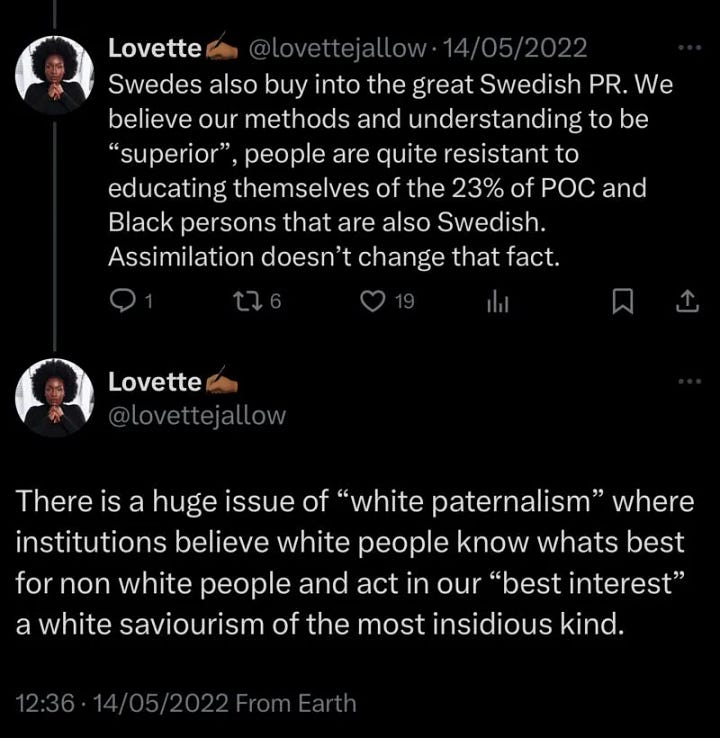
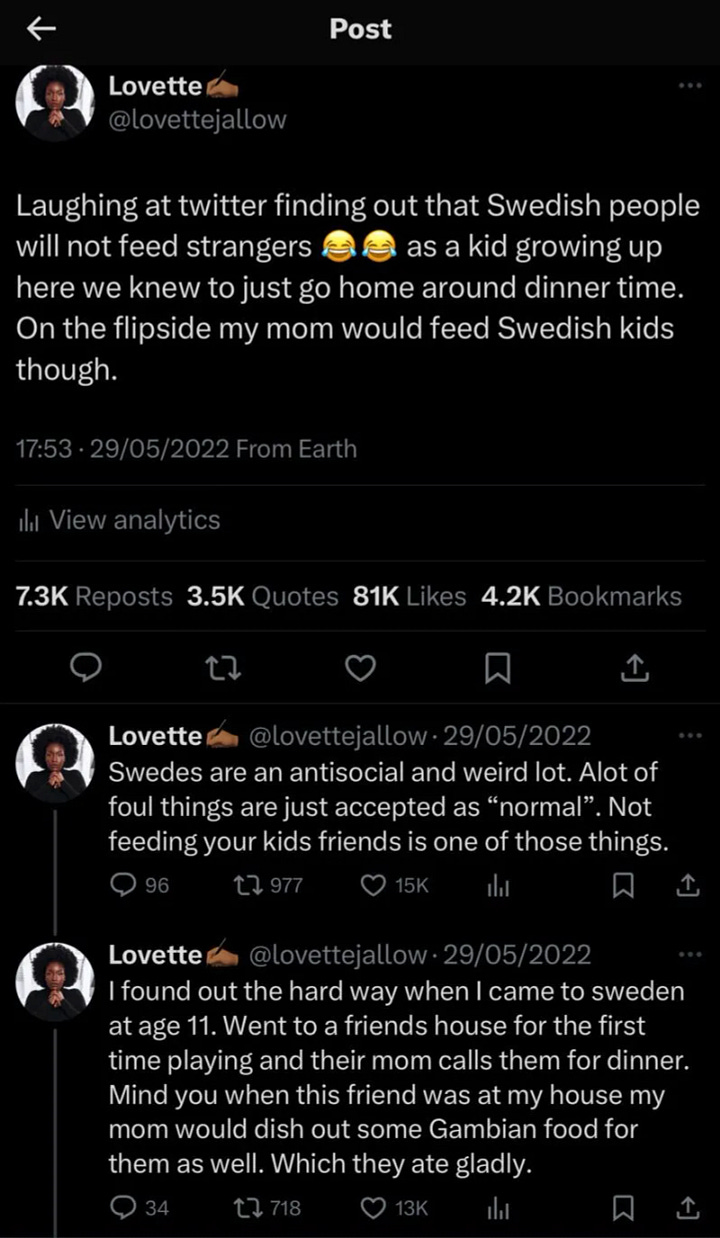
Being Black in Sweden Means Learning the Rules Were Never Meant to Include You
Growing up Gambian-Swedish in a country that prides itself on politeness, I learned early that acceptance came with conditions. I was expected to be quiet, grateful, and agreeable. Never too loud. Never too visible. And certainly never too demanding.
The dinner table was one of the first places I felt the boundary—where hospitality stopped short of inclusion. Children like me were allowed to play but not to sit at the table. Welcomed, but not fully received. Our presence was tolerated until it asked for anything more.
What happened during those playdates wasn’t just about food. It was about access, belonging, and a quiet cultural line that made clear: Swedish social cohesion often depends on the erasure of difference.
While my family shared meals with guests regardless of how little we had, Swedish norms taught me that generosity wasn’t reciprocal. That exclusion could be polite. That hunger—literal or symbolic—was mine to navigate alone.
These weren’t isolated memories. They were early lessons in what it meant to grow up Black in a society that claims neutrality but reinforces sameness. I wrote about this before in Främling i Vita Rum, where I explored how race, silence, and neurodivergence shape the everyday experiences of those Sweden refuses to fully see.
Media Coverage, Misattribution, and the Erasure of the Black Woman Behind #Swedengate
Who Gets Credited for a Cultural Reckoning?
As #Swedengate spread across the internet, media outlets rushed to report on it—The New York Times, BBC, The Daily Beast, VICE, and others. But most skipped over the actual origin. They cited Reddit threads, anonymous posts, or vague “online users.” Few named me. Even fewer asked.
It was my tweet that lit the match. Yet headlines didn’t mention a name. They rarely do—especially when the person behind the storm is a Black woman in Sweden.
That dynamic was addressed directly in an interview with Ben Brock Johnson and Amory Sivertson on their podcast episode, “Swedengate: An International Social Media Meatball-Slinging Campaign... Turned National Reckoning.”
Amory: “Every media outlet—until we got to talk to her. This is Lovette Jallow. And it’s not lost on her that she hasn’t been credited until now because, as she explains it...”
Lovette: “That is the issue of being a Black woman. If I was a white Swede who had used the hashtag #Swedengate first, there would be acknowledgment for that.”
Ben: “Lovette thinks a lot about hypotheticals such as this. She’s a diversity, equity, and inclusion consultant who’s worked with companies like Spotify and Facebook…”
Amory: “…an activist and the author of two books about what it means to be Black in Sweden…”
Lovette: “…and in my spare time, apparently I start viral threads on social media without knowing it.”
That interview was one of the few moments where authorship was properly acknowledged. But by then, the narrative had already been flattened. The irony? A hashtag about exclusion had resulted in my own exclusion from the story I started.
In The New York Times, in its otherwise sharp analysis by Lola Akinmade Åkerström, added her own awareness of the racial dynamics at play.
“A Social Media Takedown Is a Blessing in Disguise for Sweden,”
Lola Akinmade Åkerström, A Social Media Takedown Is a Blessing in Disguise for Sweden:
“The critical gaze of social media users around the world was suddenly trained on the curious Swedish tradition of not automatically offering food to guests — including children invited over for play dates — while the host family sits down to eat. It started with a Reddit user... and escalated into Swedengate, a hashtag and multilayered takedown of a nation more accustomed to praise than mockery.”
But it didn’t start with Reddit.
It started with a Gambian-Swedish woman tweeting from lived experience. It started with me.
Swedengate Was Never Just About Culture. It Was Always About Power.
There’s a reason the hashtag triggered such an intense national response.
It wasn’t the food.
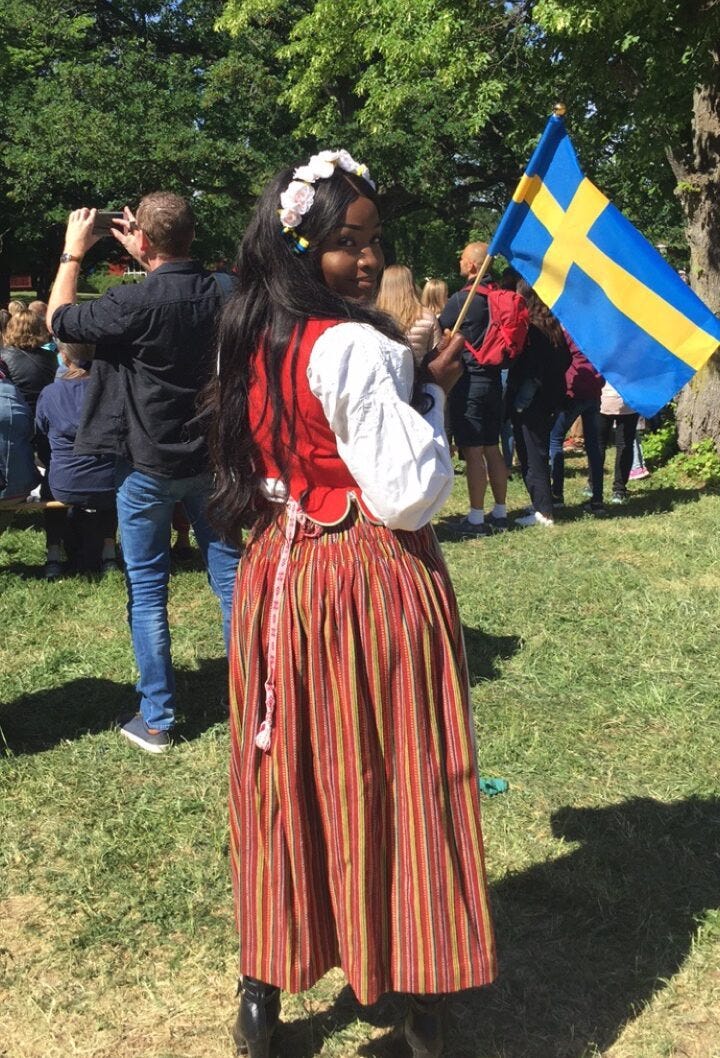
It was the audacity of someone like me—a Black, visibly Muslim, autistic woman—speaking plainly about a cultural truth Sweden prefers to avoid. It disrupted a narrative the country has carefully exported for decades: that Sweden is progressive, post-racial, and morally neutral.
The backlash wasn’t about meatballs.
It was about the mirror.
When I tweeted about a common Swedish practice—refusing to offer food to visiting children—it struck a global chord. But within Sweden, it struck a nerve. The tweet went viral. So did the outrage. What many missed was that the practice itself wasn’t new. It was the context—and the person naming it—that made people uncomfortable.
I was accused of tarnishing Sweden’s reputation.
Called ungrateful.
Hit with a wave of racist vitriol that felt eerily familiar.
“It wasn’t unusual for kids to call me a monkey or ask if my skin was brown because I smeared myself with poop,” I’ve said publicly.
“Speaking the truth in Sweden as a Black woman always comes at a cost.”
But that’s precisely why it had to be said.
The #Swedengate Hashtag Was a Spark. What It Ignited Was Centuries of Silence.
Across Twitter threads, Reddit reposts, and news articles, the hashtag opened a floodgate.
People began sharing their own memories—of being told to wait alone while a family ate dinner, of exclusion disguised as etiquette, of feeling welcomed but never fully included.
From The Daily Beast: #Swedengate Explodes on Twitter as Americans Express Shock Over Swedes’ Refusal to Feed Guests
“Multiple people recalled childhood memories of sitting alone in a playroom while their friend sauntered down to the dining room for a plate of köttbullar without them.”
The stories weren’t just about Sweden.
They were about whiteness.
They were about how many white-majority societies normalize exclusion—then gaslight the people who name it.
But when that naming comes from a Black woman? The reaction isn’t curiosity. It’s correction.
Sweden’s Progressive Reputation Is Built on Silence
In my 2018 TED Talk, Normalizing Silence in Swedish Society, I said what many of us already knew: Sweden performs progressiveness while refusing to confront its deep structural exclusions.
We love to rank highly on global indexes—gender equality, innovation, education. But few of those lists ask how it feels to live here when your name isn’t Johan, your parents weren’t born in Europe, or your skin isn’t pale.
“This is the Swedish PR machine working overtime. We top a lot of positive lists.
But whose experiences are they measuring?”
Sweden often confuses politeness with equity.
Neutrality with fairness.
And silence with peace.
That’s why a single tweet became a cultural earthquake.
Because it cracked the surface—and exposed what lies beneath.
The Failure of Swedish DEI: White Paternalism in a Midsummer Dress
In my work across Sweden, Europe, and the MENA region, I’ve seen this pattern repeat:
DEI roles are often held by people with the most privilege and the least structural analysis.
“We still have huge issues with white paternalism—where institutions believe white people know what’s best for non-white people and act in our ‘best interest.’”
Instead of co-creation, we get condescension.
Instead of strategy, we get slogans.
Instead of change, we get brunch panels.
“DEI is failing in Sweden because white women now lead that role—
with an analysis more shallow than a puddle after a two-minute drizzle.”
Swedengate didn’t create this truth.
It revealed it.
The Truth Behind #Swedengate: Why Sweden Listens Only When It’s Loud
I Don’t Regret the Tweet. I Regret That It Had to Be Said Like That to Be Heard.
People often ask if I regret posting it.
I don’t.
Because I didn’t start the conversation—the silence was already there. The experiences were already happening. I just put words to it. Publicly. In a way that couldn’t be ignored.
Swedengate showed how a single anecdote could unearth generations of gatekeeping—around race, nationality, belonging, and who gets to critique Swedish culture without punishment.
The conversation wasn’t a distraction. It was a disruption.
Not a detour, but a demand.
The tweet may have gone viral in 2022. But the systems behind it are still in place. What happens next isn’t about trending hashtags. It’s about long-term truth-telling.
That’s the work I do.
Through writing, public speaking, and policy consulting.
I name what others try to leave unnamed.
Closing: Who Gets to Speak—and Who Gets Erased in Sweden?
“No one is voiceless.
Some are silenced when they speak to the point of threats.
Others never pass the microphone.”
If you’ve made it this far, you already know who I am.
I’m not Sweden’s diversity prop.
I’m not here to protect illusions.
I’m here to speak clearly—because clarity is the first step to change.
“This is the Swedish PR system working overtime. We top a lot of positive lists, but whose experiences do they take into account? Certainly not the 33.3% of the population with one or both parents born outside Europe.”
Keep Reading: More Essays on Sweden, Blackness, and Structural Racism
Want more context on anti-Blackness in Swedish society, the cost of truth-telling, and what it means to live at the intersection of race, neurodivergence, and resistance?
Who is Lovette Jallow?
Lovette Jallow is one of Scandinavia’s most influential voices on systemic racism, intersectional justice, and human rights. A nine-time award-winning author, keynote speaker, lecturer, and humanitarian, she specializes in neurodiversity, workplace inclusion, and structural policy reform.
As one of the few Black, queer, autistic, ADHD, and Muslim women working at the intersection of human rights, systemic accountability, and corporate transformation, Lovette brings an unmatched perspective rooted in both lived experience and professional expertise. Her work bridges the gap between theory, research, and action, helping organizations move beyond performative diversity efforts toward sustainable, structural change.
She has worked across Sweden, The Gambia, Libya, and Lebanon, tackling institutional racism, legal discrimination, and refugee protection. Her expertise has been sought by global publications like The New York Times, on high-profile legal cases, and by international humanitarian organizations, where she has provided critical insights on racial justice, policy reform, and equity-driven leadership.
As the founder of Action for Humanity, Lovette collaborates with businesses, policymakers, and institutions to develop equity-centered solutions that are practical, measurable, and embedded in long-term strategy.
Follow Lovette Jallow – DEIB Strategist, Keynote Speaker & Humanitarian:
Website: lovettejallow.com
LinkedIn: linkedin.com/in/lovettejallow
Instagram: instagram.com/lovettejallow
YouTube: youtube.com/@jallowlovette
Twitter/X: twitter.com/lovettejallow
Action for Humanity Instagram: instagram.com/action4humanity_se


